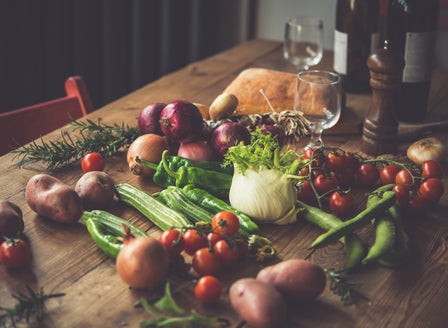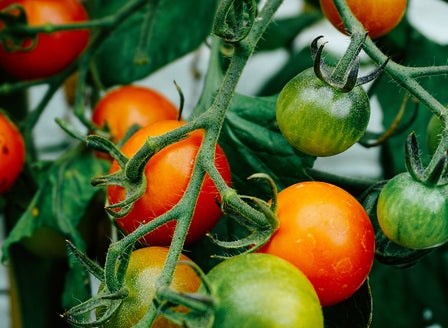One of the most popular summer vegetables, eggplant is easy to grow and tastes delicious in a variety of dishes. Also known as an aubergine or brinjal and originating from India, eggplants are technically classed as a berry.
Planting Calendar
Eggplants enjoy the hot summer temperatures, hence the best time to plant them is after Labour Weekend (October -January). If growing from seed, soak the seeds in water for a few hours to encourage germination. Sow the seeds in a good quality seed raising mix. Normal germination time is 7 -10 days.
Prepare
Position
Eggplants are best grown in a hot sunny position, with a minimum 6 hours of full sun everyday.
Soil
Eggplants grow well in a well drained soil rich in organic matter. Ideal pH of the soil is between 6.5 -7.5. If planting in the ground or in an existing garden bed, fork up the soil and add King's Organic Compost and Kings sheep pellets. Cover this with a layer of Living Earth Organic Veggie Mix. If planting in pots, use Living Earth Organic Veggie Mix or Kings Container Mix.
Pollination
It is advisable to plant bee friendly plants like lavender, borage, marigolds around eggplants as they help in attracting pollinators.
Plant
When planting into the ground, gently tap the plant out of its pot. Dig a hole twice the depth and width of the plants root ball. Mix Kings Compost into your existing soil at a 50/50 ratio, add Sheep Pellets and Kings Natures Organic Fertiliser, then mix together. Back fill the hole with this soil, so that when planted the top of the plant’s roots sit level with the surrounding ground. Firm the soil down gently and water in well with Aquaticus Organic Garden Booster. Space the seedlings at least 30 -40 cm apart. Eggplants require staking for support as the plants can get top heavy.
Care
Watering
Watering is essential especially in the first year of planting to allow the roots to get well established. Water slowly allowing the water to sink down into the roots, rather than allowing it to run off the top of the soils surface. Add Saturaid into the soil at planting as this will help channel the water deep down into the root zone. Consider setting up an automatic watering system – these can be simple and inexpensive. Lack of water results in stunted growth and distorted fruit. Over watering can cause root rot and other fungal infections.
Feeding
When planted in the ground liquid feed every month with Aquaticus Garden Booster, from Spring through to the end of fruiting, this encourages root growth and increases the microbial activity in the soil. Monthly applications of Kings Sheep Pellets will help with soil conditioning and plant health. If planted into a container, feed with Kings Liquid Fast Food along with monthly applications of Aquaticus Organic Garden Booster this encourages strong roots and a healthy immune system. Adding Aquaticus Organic Soil and plant conditioner during flowering helps in calcium uptake and prevents blossom end rot.
Protecting
Eggplants are have brittle stem, that along with the weight of the fruit provide the plant with some support to avoid broken stems. Protect young plants from slugs and snails by applying regular applications of Tui Quash.
Spraying
Aphids, caterpillars, spider mites and thrips are common insect pests which can be controlled by spraying with organic Bugtrol.
General Care
When using sprays, chemicals or fertilisers always read the label and follow the instructions. Apply sprays in the evening to avoid harming beneficial insects.
Expert Tip
Eggplants are prone to soil borne diseases caused by fungi. Therefore it is recommended to rotate your crops and avoid growing them on plots that have been used for other related species like tomatoes, capsicums, chillies and potatoes in recent years. A plot which has been rotated with green manure crops is recommended for planting.
Tip
Pinch the first few formed flowers to allow the stem and leaves to grow enough to bear more flowers and fruit set.
Top Varieties
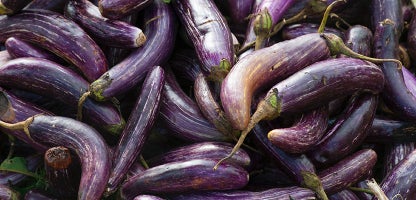
Eggplant Dok
This variety is a high yielder with fruit that are long and violet pink. A popular variety for Asian cuisine.
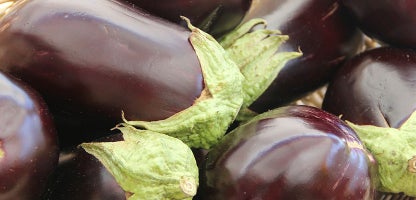
Eggplant Bonica
Bonica is a heavy cropper and is resistant to diseases, producing oval large purple fruit.
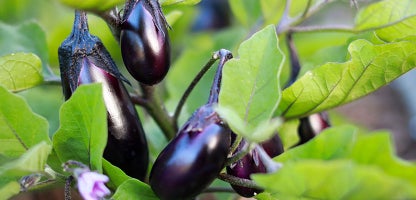
Eggplant Black King
A popular variety that produces large oval fruit with shiny black skin.
Frequently Asked Questions
When is the best time to plant eggplants?
The best time to plant eggplants is from late spring to early summer (November to December). This ensures they have the warm weather needed to thrive.
How often should I water my eggplants?
Watering is essential especially in the first year of planting to allow the roots to get well established. Water slowly allowing the water to sink down into the roots, rather than allowing it to run off the top of the soils surface. Add Saturaid into the soil at planting as this will help channel the water deep down into the root zone. Consider setting up an automatic watering system – these can be simple and inexpensive. Lack of water results in stunted growth and distorted fruit. Over watering can cause root rot and other fungal infections.
How do I support eggplants as they grow?
As eggplants grow, their fruit can weigh them down. Stake the plants or use tomato cages to provide support and prevent the branches from breaking
When and how should I harvest eggplants?
Fruit set is usually after 60 -75 days of planting and fruits are ready for harvest after about 90-120 days since planting. It is advisable to cut the fruit with sharp secateurs rather than pulling them off the plant as this can cause damage.
What common pests should I watch out for?
Common pests include aphids, spider mites, and whiteflies. Regularly inspect your plants and use insecticidal soap or neem oil if you notice any infestations.
